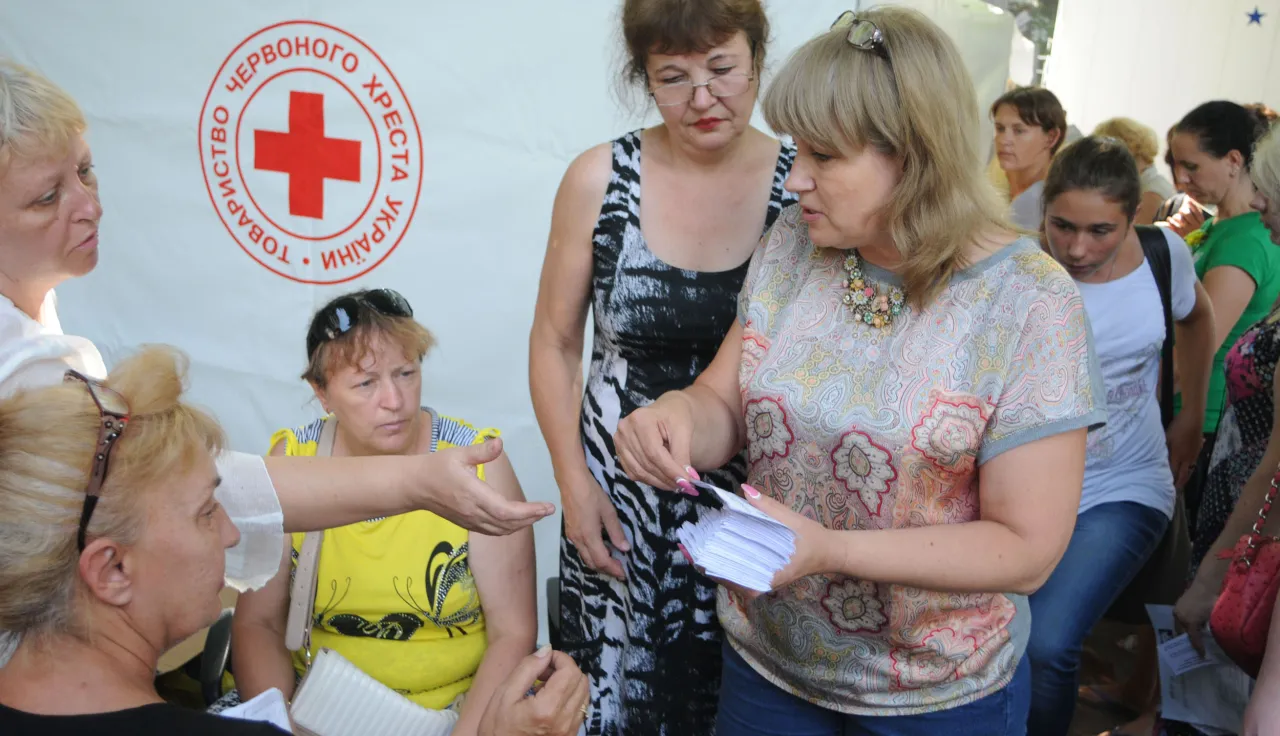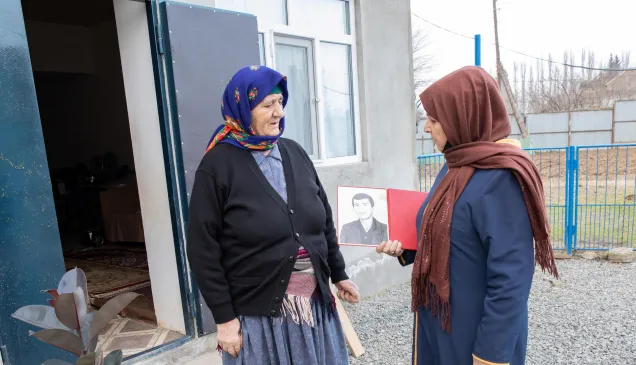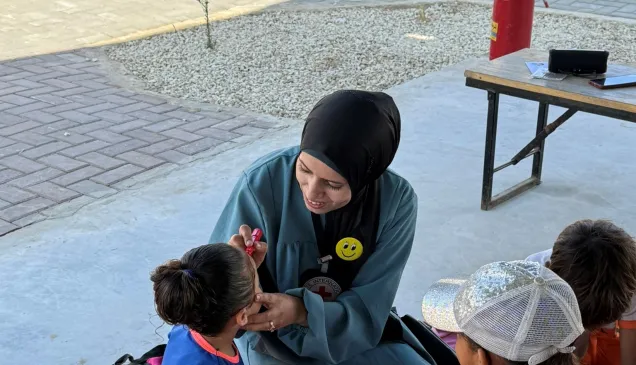Ukraine: ICRC steps up aid amid fragile ceasefire

The 5 September ceasefire agreement has brought some respite to people affected by the conflict in eastern Ukraine. Amid hopes that this will lead to a permanent cessation of hostilities, the ICRC is helping people face the consequences of the fighting.
Situation
Today, the ICRC delivered 60 tonnes of food aid to Lugansk, supplementing supplies received from Russia and elsewhere over the past weeks which were distributed by the local authorities to people in need.
“With winter coming up, ICRC is working with the local authorities in eastern Ukraine to meet the most pressing needs," said Michel Masson, head of the ICRC delegation in Ukraine. In the coming weeks, the ICRC will be distributing basic shelter materials in Lugansk, enabling rapid repairs to the roofs and windows of 500 homes and is currently purchasing glass, cement and roofing material to repair the houses of some 31,000 people in the Slavyansk area.
There are reported to be 250,000 displaced people inside Ukraine, most of them from the Lugansk and Donetsk regions. Many more have fled to Russia. Some people are now returning to find public infrastructure damaged or destroyed and basic services, such as health care and education, disrupted.
At the same time, the situation in the Donetsk region is causing concern, as it has become more volatile in the last few days, with sporadic confrontations leading to casualties among civilians.
The ICRC’s humanitarian efforts are focused on areas where it has expertise, such as assisting hospitals, helping the authorities to manage dead bodies in a dignified manner and visiting people deprived of freedom in connection with the conflict.
"We remain in contact with the Ukrainian and Russian authorities on their humanitarian initiatives," said Laurent Corbaz, head of ICRC operations in Europe and Central Asia. "So far, Ukraine and Russia have not reached a final agreement on the terms and conditions of a cross-border aid operation. In the absence of such agreements, we cannot facilitate the passage of convoys from Russia. However, we are continuing to advise on and facilitate the distribution of aid by the local authorities."
Electricity and mobile phone coverage have been restored in parts of Lugansk, and people can find areas from where they can call their relatives. At the same time, the ICRC continues to collect short "I am alive" messages from people who have still not managed to reconnect with their families.
Here is an overview of our recent activities:
ICRC Activities
Food
- In Lugansk, the ICRC delivered 60 tonnes of food from Severodonetsk on 19 September.
- Since the beginning of September, the ICRC has worked with the Ukrainian Red Cross Society to help over 50,000 displaced people in eastern Ukraine obtain food, distributing food in the northern part of the Lugansk region and issuing supermarket vouchers to particularly vulnerable people in the Kharkiv and Mariupol areas.
- The ICRC is currently sending 40,000 family parcels to families in the conflict-affected areas of eastern Ukraine. Each parcel contains 60 kilos of basic food items.
Health
Lugansk
- The ICRC will shortly be delivering supplies to Lugansk Regional Hospital. This follows a delivery of medical supplies for the treatment of 300 casualties earlier this week.
- An ICRC surgeon has just completed a two-day seminar on war surgery at Lugansk Regional Hospital, which was attended by 40 surgeons and traumatologists.
- The ICRC is providing forensic supplies for the city mortuary and other facilities, to help in the dignified handling of bodies.
Donetsk
- ICRC teams have visited hospitals in and around the city, delivering enough medical supplies such as dressing material, sutures and intravenous fluids fluids to enable 300 operations to take place.
- The ICRC has provided forensic supplies for the regional mortuary, the forensic institute and hospitals.
Shelter
- In the coming weeks, the ICRC will be distributing basic shelter materials in Lugansk, enabling rapid repairs to the roofs and windows of 500 homes. We will also be providing both materials and expertise to help repair the city's water network.
- As part of a broader effort to help people in conflict-affected areas cope with the oncoming winter cold, the ICRC is currently purchasing glass, cement and roofing material to repair the houses of some 31,000 people in the Slavyansk area.
- The ICRC is preparing materials for repairs to the roofs and windows of hospitals in Donetsk and Lisichansk.
Other aid
- The ICRC has supplied over 800 people in Odessa with such items as mattresses, blankets, hygiene items and wheelchairs.
- We have provided telephone credits to some 30 disabled displaced persons, so they can stay in touch with their families.
- The ICRC is preparing 30,000 family hygiene parcels and 30,000 sets of essential household items for families whose houses have been destroyed or who live in areas without a regular water or electricity supply.
Detainee welfare
- During the week of 15 September 2014, the ICRC was able to visit people detained in relation with the conflict and other violence in Zaporizhia, Odessa and Kiev, in order to monitor their treatment and the conditions of their detention.
- We are in discussions about visiting people held in Donetsk and Lugansk.
- The ICRC is ready to act as a neutral intermediary for the simultaneous release of prisoners.
Restoring family links
Since the beginning of September, the ICRC has collected over 80 "I am alive" messages from people in Lugansk, for delivery to relatives in Ukraine and abroad.
Unexploded munitions
- The ICRC is currently preparing materials for an awareness campaign in the Donetsk and Lugansk regions on the dangers of unexploded munitions.
- An ICRC specialist is advising the authorities on the marking and clearance of areas containing unexploded munitions.
Conduct of hostilities
The ICRC is maintaining contact with all parties to the conflict on the issue of conduct of hostilities. In particular, we are urging them to refrain from attacks on civilians or civilian objects.
For further information, please contact:
Alina Murzaeva, ICRC Kiev, tel: +380 675 094 179
Anastasia Isyuk, ICRC Geneva, tel: +41 22 730 30 23 or +41 79 251 93 02
Galina Balzamova, ICRC Moscow, tel: +7 495 626 5426 or +7 903 545 3534



